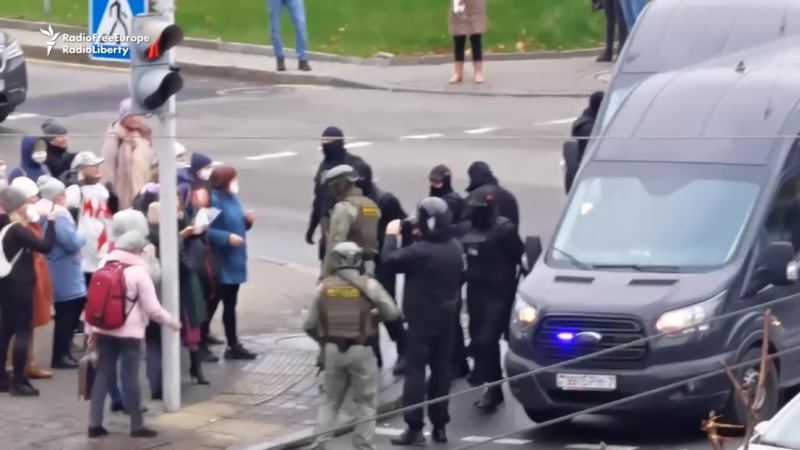
MINSK — Police in Belarus have detained hundreds of anti-government demonstrators who gathered for the 13th consecutive Sunday of protests to call for the resignation of Alyaksandr Lukashenka and a new presidential election following a disputed vote in August.
The Vyasna human rights group said 548 people had been detained by security forces on November 8. The arrests were made in Minsk, Homel, Vitebsk, Zhlobin, and other cities. The group said some of the detainees were later released.
Minsk city police earlier said that about 10 people were detained over “unsanctioned actions.”
There was a heavy police presence from the early morning in Minsk, where participants in the March of Democracy waved red-and-white flags and umbrellas that have become the symbol of the opposition. Security forces blocked several streets and cordoned off areas in central Minsk.
Access to the Internet was restricted in the capital since the morning. Several subway stations in the city center closed an hour before the rally, citing “passenger safety.”
The protests come after police detained dozens of medical professionals at an unauthorized protest against Lukashenka on November 7.
About 60 doctors and other health-care workers who gathered for the demonstration on November 7 were taken away to police stations, according to the human rights group Vyasna. Most were expected to be released shortly.
Yulia Yarmak was the first of the medical professionals detained, according to RFE/RL’s Belarus Service. She said police had promised to release all detainees except one journalist on November 7.
Meanwhile, the Belarusian Association of Journalists said on November 8 that two reporters detained while covering the medics’ rally were transferred to the Akrestsina prison in Minsk.
It identified the reporters as Yekaterina Karpitskaya from the Nasha Niva and Raman Papkov from the MBKh-Media publications. The association said there were at least 14 journalists in custody in Belarus.
There have been protests almost daily against Lukashenka in Minsk and elsewhere in the country since the presidential election, which protesters alleged was rigged and that Western countries have refused to accept.
Opposition leader Svyatlana Tsikhanouskaya, who has been living in Lithuania since shortly after the election amid threats to her and her family, praised the medics for their courage and peaceful action, and slammed the authorities for arresting health personnel in the middle of a pandemic.
Several doctors have lost their jobs because of strikes or protests, actions that Tsikhanouskaya criticized, saying Lukashenka was sacrificing people’s lives to stay in power.
Lukashenka has faced strong criticism from the medical community and the population for having resisted calls for strict lockdown measures to contain the coronavirus.
Lukashenka downplayed the pandemic in the spring and summer, but partially closed all the country’s land borders to foreigners on November 1 as second wave of the virus engulfs Europe.
Tsikhanouskaya also accused the authorities of hiding the true extent of the pandemic in the country.
Belarus reported 997 new infections, a new daily record, and three deaths related to the virus on November 7 for a total of 105,283 infections and 1,004 deaths.
Also on November 7 at least 14 people were detained at a separate women’s march in Minsk, Vyasna said.
As on previous Saturdays, the women walked along Independence Avenue holding flowers in protest against Lukashenka.
Tsikhanouskaya also criticized Lukashenka for the construction of a nuclear power plant in Astravets near the Lithuanian border without the people’s consent.
The nuclear power plant, the first in Belarus, has been heavily criticized by Lithuania as a potential environmental and security threat.
Lukashenka boasted that Belarus “will become a nuclear power” at its official opening on November 7.
“The Astravets nuclear power station is a new step into the future, toward ensuring the energy security of the state,” Lukashenka said in comments broadcast on state television.
Built by Russian state-owned firm Rosatom and financed by Moscow with a $10 billion loan, construction of the power plant near the city of Astravets, in the western Hrodna region, was opposed by Lithuania, whose capital, Vilnius, is just 50 kilometers away.
Astravets draws water for its cooling reactors from the Nevis River, which also supplies drinking water in Lithuania.
Belarus began operating the plant earlier this week, prompting Lithuania to halt electricity imports from its neighbor.
The plant’s construction has also been divisive among Belarusians, who suffered greatly from the 1986 Chernobyl nuclear disaster. Belarus saw a quarter of its territory contaminated in the world’s worst civilian nuclear accident.
